How To Eat Out
Lessons from a Life Lived Mostly in RestaurantsGiles Coren
Giles Coren sets out the gospel for restaurants
His opinion of steak snobs:
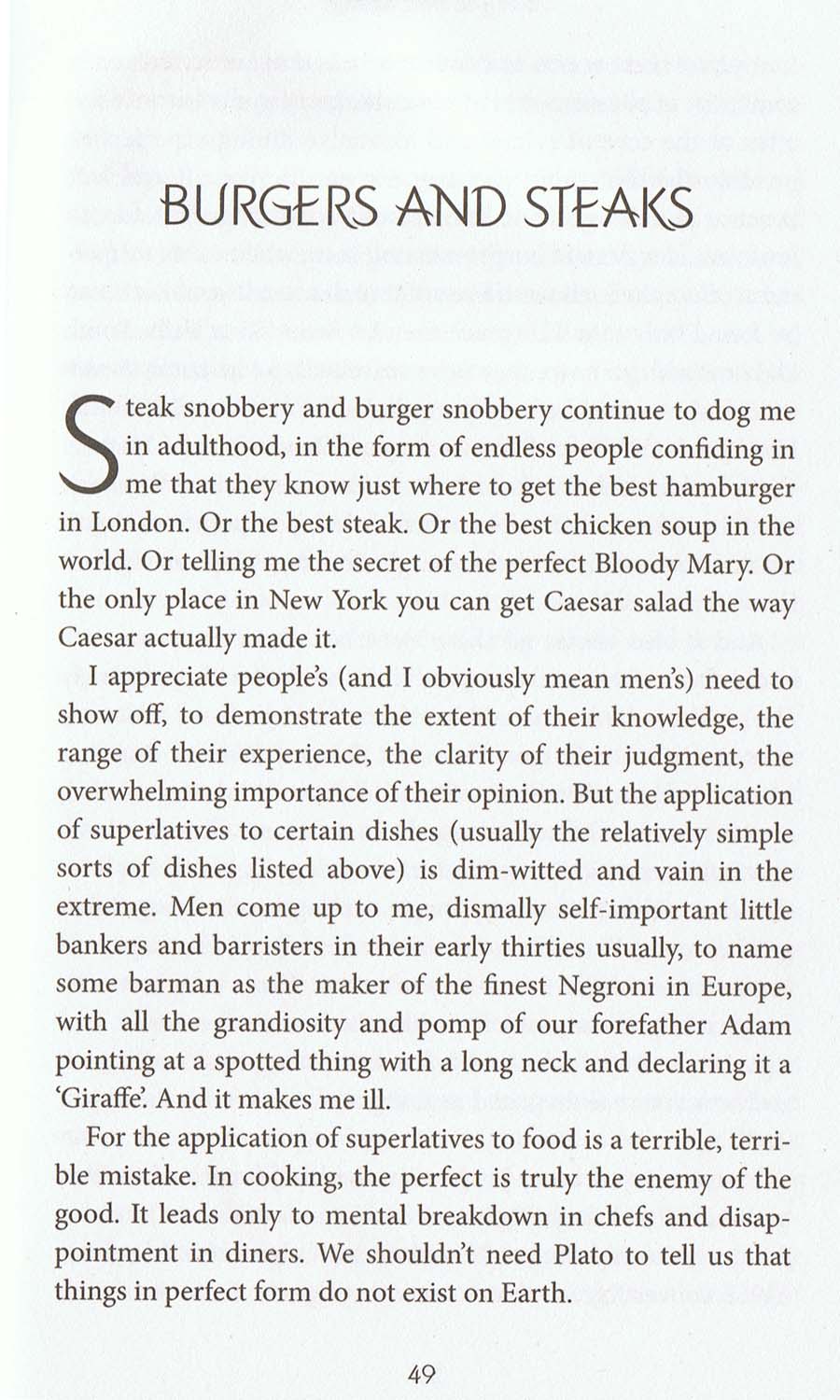
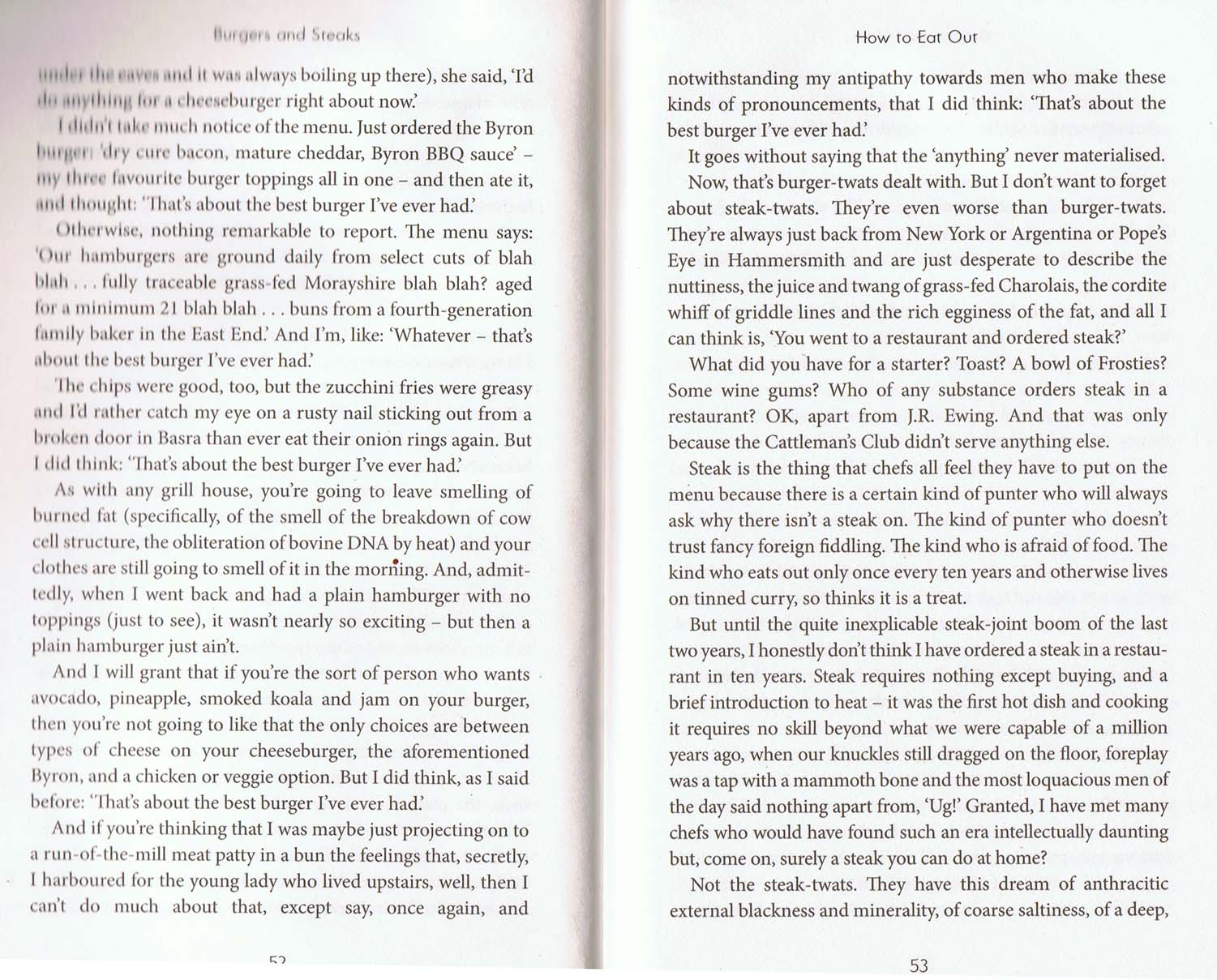
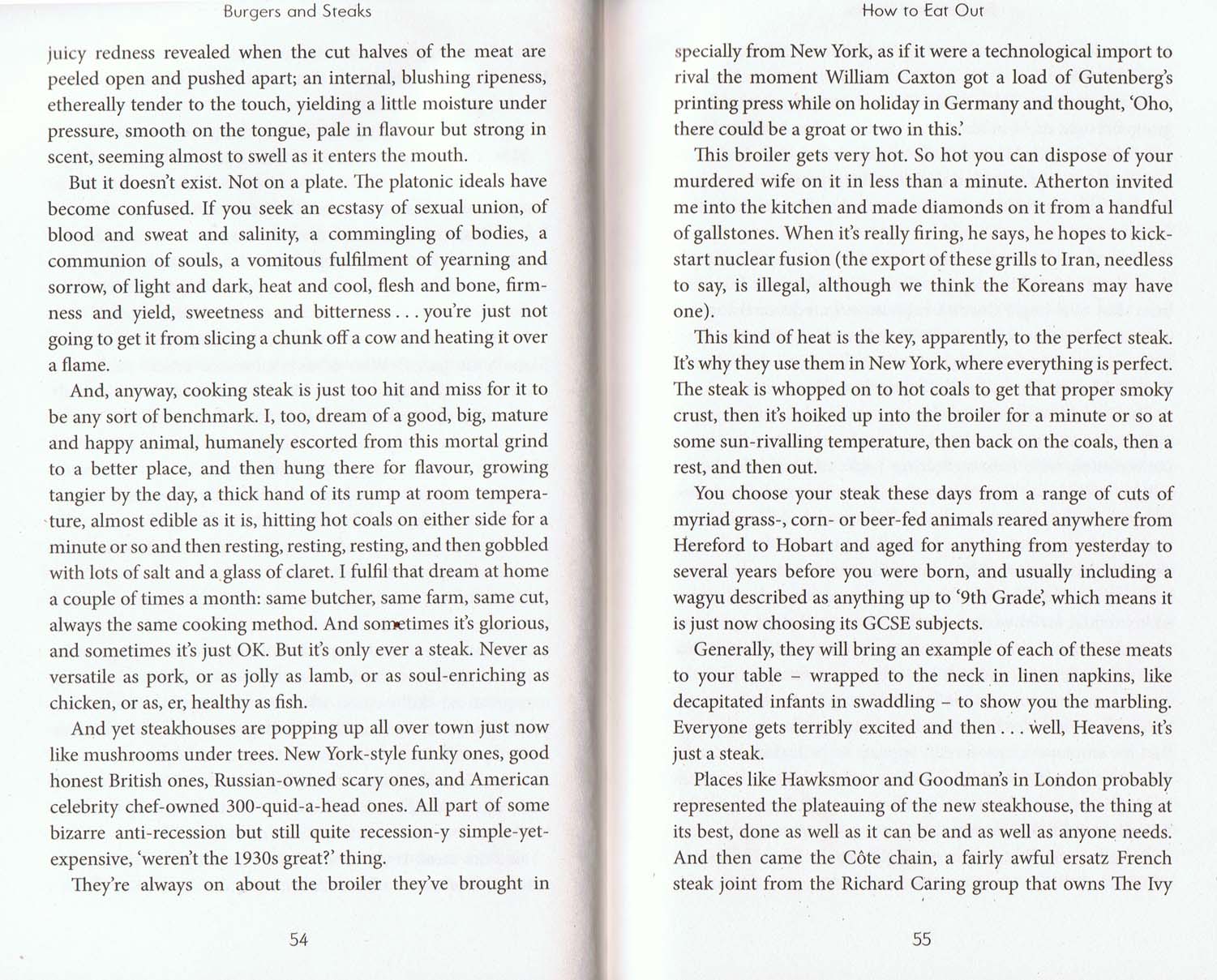
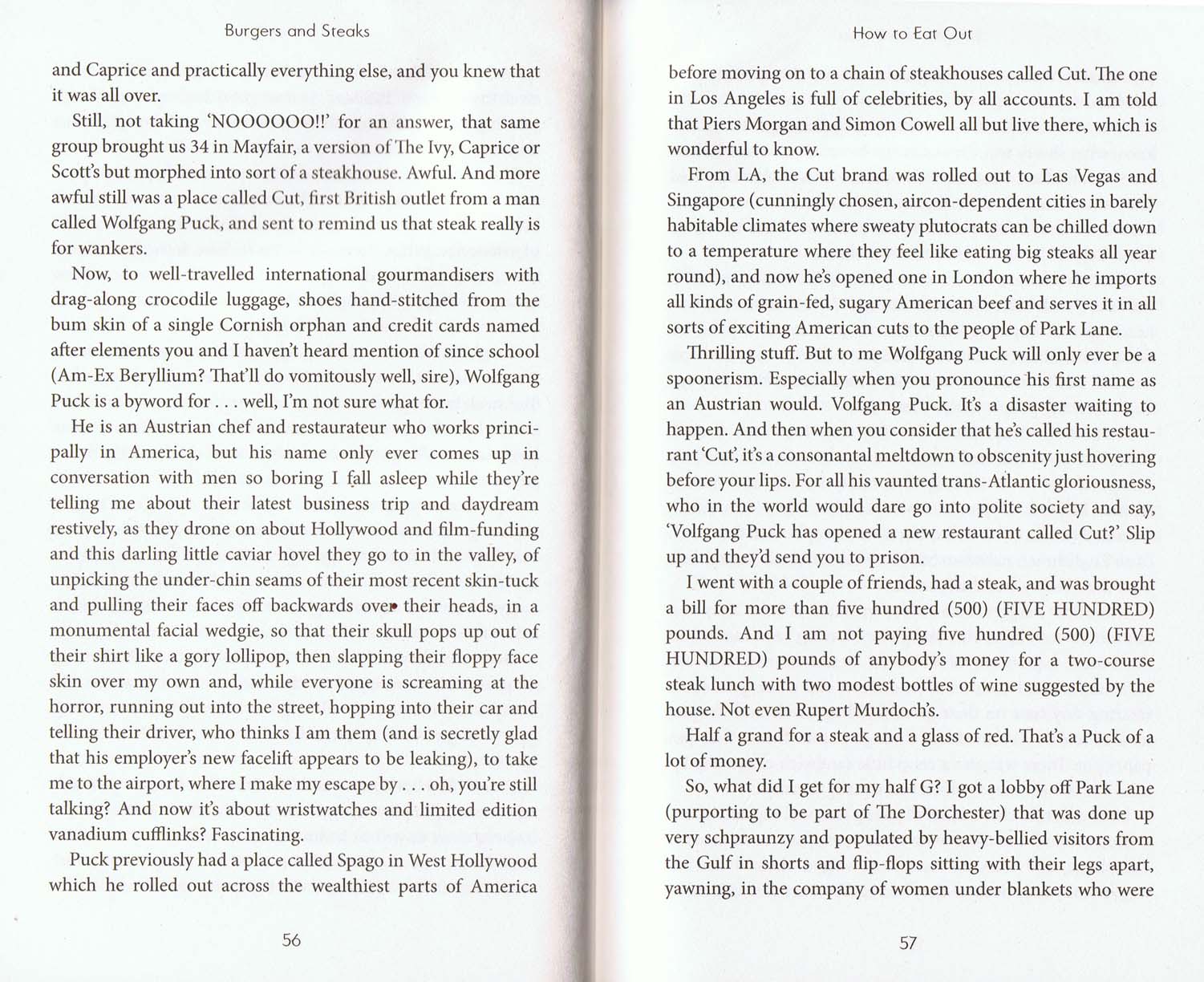
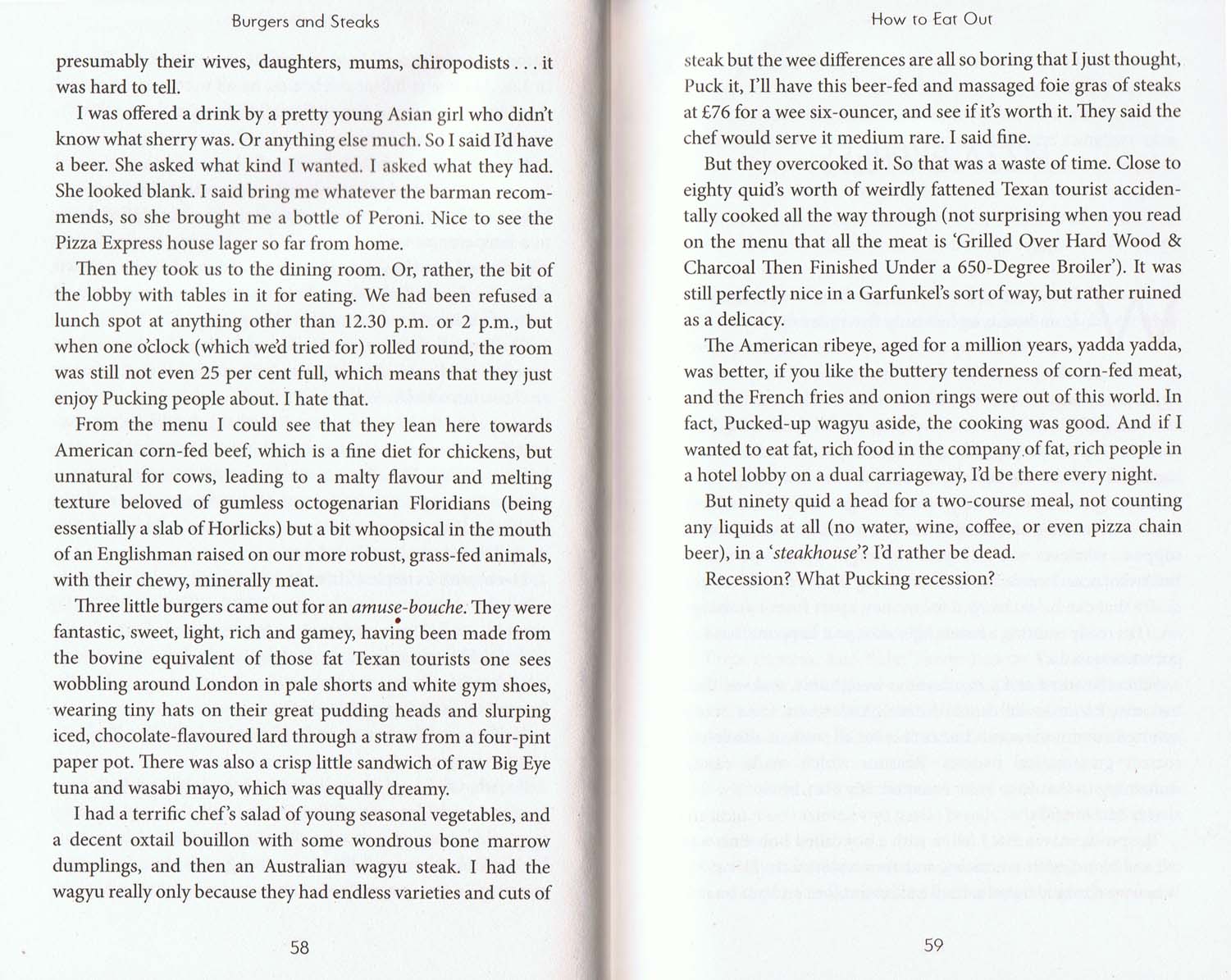
Lay off the bread
An ex-girlfriend of mine eats nothing all day. She claims she doesn't get hungry. So whenever we meet for dinner she is utterly starving and inhales the entire bread basket and three clods of butter without pausing for breath. Then halfway through her main course she starts poking about and saying, "I don't know why they give you such large portions, I'll never eat all this!"
I just don't know why people eat the bread. You shouldn't be that hungry. Ever. Bread is not a first course. It is a breakfast food, an accompaniment to certain terrines, and the food that in most Western cultures has traditionally stood between the poor and starvation. But in some 50-quid-a-head place with a chef off the telly and a whole range of exciting things to chew on for the next couple of hours, why would anyone want to fill up with bread? Even if it is a hand-milled biodynamic spelt flour roll with cold-pressed virgin cobnut oil, sun-dried tomato, fontina cheese, dark chocolate and the dingleberries of a girl unicorn? It'll ruin the whole damn meal. And make you fat.
And anyway restaurants should be discouraged from all this "artisan bread that we bake ourselves every morning" because baking is not a restaurant's job. It is a baker's job.
And restaurants are never any good at it. I always tell them, as soon as I arrive, to bring no bread. But sometimes they do and you must tell them to take it away. You are not a Victorian orphan. You are not a medieval leper at the gates of the big castle. What in the world do you want with a bloody bread roll?
You shouldn't be that hungry. Ever. It just isn't modern. It is born of that old "Don't eat between meals" fascism that was only ever conceived as a random rule to give Edwardian fathers another reason to thrash the crap out of their children. Any civilised person arriving in a restaurant around 8pm should have had a glass of sherry and a smackerel of something around half past five. If only so that you don't fall on the bread as soon as you sit down like a f***ing fox in a dustbin.
How to order wine
Just have a conversation with the waiter, for Heaven's sake. As you would do if you were buying a car or a flat or a slave. Conversation is the key. A little chat. If he offers something more expensive than you've suggested, you can say, "These others are undrinkable, are they?" It doesn't need to be firmer than that. Please don't be embarrassed to mention the money. Wine is bought and sold by everyone for money.
Growers, makers, exporters and importers, dealers, critics, chain-shop owners, sommeliers and restaurant buyers talk about cost all the time, in the first breath, before anything else, so it is preposterous for all that talk suddenly to stop at the restaurant table, and everyone be too embarrassed to talk about it. There is value to be had away from big-named wines that command less fashion value, and you can ask for advice if you want that sort of value.
But by and large bottles of wine end up costing more or less what they are worth, relative to other bottles of wine. I usually walk into a restaurant thinking, "I fancy a twenty quid bottle of Chianti", or "I think I'll see if they can do a Meursault for under fifty", or "I'm going to get shitted on the cheapest Riesling they have". And it is nothing at all to be embarrassed about. Except maybe the last one.
Always order the fish
Really good fresh (environmentally sustainable) fish is very hard to come by, very hard to store and keep fresh (you've got to really cook it as soon as you buy it or there's no point), often fiddly to work with, and very smelly to cook. It's what restaurants are FOR!
It so happens that I eat out a lot, so it's a good way of not exploding into an impossibly fat bastard, too, and getting the various good things one gets from fish in terms of lean proteins, special mysterious don't-actually-exist anti-cancer minerals and fatty acids, without having to argue for hours about the glassy-eyed bastard on the slab, wrap it in a billion bags so it doesn't bend everything in the fridge to its own particular pong (mackerel butter is one of my least favourite things), cook it almost immediately at the wrong temperature for the wrong time so that it's either gloopy along the bone or all stuck to the foil/pan/oven/ wall/side of my head, and then spend a week living in a house that smells like the command centre of some marine animal-oriented Nazi death camp, some fish Treblinka. Auschfishtz, if you will.
It just amazes me that people will go into a restaurant and order the steak. A thing you can buy almost anywhere, keep for weeks, and cook however you like without doing anything to it and it'll always basically be OK. You're letting these chefs off lightly like that. At least make them work for a living.
How to complain
Nicely, politely, apologetically. But firmly, and at the very moment of disappointment. You must think of yourself as a kind but rather strict parent, and the restaurant (in an abstract ontological sense, not the individuals working in it) as your child. Appreciate it and applaud it for what it does well, and tell it very clearly and firmly, but not hysterically and not pompously, when it has erred.
"I'm awfully sorry to make a fuss," you might say, "but this fish really isn't as fresh as I'd hoped. You smell that faint whiff of ammonia? That's never a good sign with a skate — although I do appreciate the hell of keeping skate fresh for more than a couple of hours. I really can't eat this."
"What else might I have as a replacement that can come quickly? I don't want my guest to be kept waiting, or for her food to get cold."
There's simply no way you can lose with that. If they try to tell you that the skate is perfectly fine (as happened to me once at the Oxo Tower in London), then you can invite them to taste it (as I did) and watch in glee as they go green in the attempt.
The end result is likely to be free main courses, a jolly time and an amicable departure. You have to think about what your goals are (and the above is presumably about right). It may be insanely satisfying to shout, "Jesus H. Christ, Pedro, you expect me to eat this? It might be all right where you come from, but in this country we wouldn't feed shit like this to our CATS!" But it gets you nowhere. I know. I have done it many, many times.
The restaurant is the child, and it needs to be told how to improve. It will respect you if you treat it firmly but kindly. And it simply won't understand, or give a damn, if you leave your complaint to the end of the meal or, God forbid, a letter some days later. You must strike while the iron is hot, or the soup is cold, or whatever. If you do not, you are just a mug Englishman and deserve to sit there while the Frenchies get all the best food, the Spanish get all the freshest fish, and the Germans get all the money.
How to get the most from your local
The best restaurant in the world (I reply boringly, when boringly asked) is the nearest restaurant to your home office/hotel/prison where they serve at least one dish you look forward to eating, are quite nice to you when you walk in, and have at least one bottle of wine that won't kill you. It's all about walking there and walking back. All about focusing on the time in the restaurant, not the time on the bus/train/plane/horse or in the car.
More books on Food
And if there isn't one, make one. This is easier than it sounds. Most people who run restaurants (the exception may be greasy spoons and certain ethnic takeaways) know how to cook, but don't bother doing it for their customers, only for friends and family. So become their friend.
Find any nearby Italian/Spanish/ French/Polish/Brazilian restaurant and go once a week for a bit, even twice (a weeknight followed quickly by a Sunday lunch). Tip. Not stupidly high, but above the included service amount. Tread the fine line between generous pal and flash wanker.
The next time, ask them what they had for staff lunch or what the chef had for lunch. Ask for that. Ask what the best thing is the chef cooks, and if it isn't on the menu today, can they let you know when it's next on?
Give them your phone number. (The last few times you've been introducing yourself by name and repeating theirs back to them so that you remember it.) Always ask after their children. Buy them a drink. All of this may sound weird and pervy and sick and needy, but it is only in Britain that this behaviour is not normal.
In Europe, staff and customers (outside of the haughtiest Michelin hellholes) go as equals.
The point is that you are becoming a friend. Friends don't give you the old whiffy bit of fish from the fridge. They don't leave you waiting an hour for your dinner. They don't overcharge you. They don't give you the shite table by the loos. They don't get huffy when you tell them their wine buyer has sent them an iffy case.
And what else could you possibly ask from a restaurant? That is what a great restaurant is. That is what I get in most restaurants just because of my silly job and being on the telly sometimes. I get people pretending to be my friend and trying to give me the best possible night out — which is a bit revolting and sad, but better than nothing.
When I am old and jobless and nobody gives a f*** what I think about restaurants or anything else, I will do all of what I've just described, to create a few little places here and there that I can call home.
How to stay healthy in a Chinese restaurant
Chinese food, even at the top end, can involve a lot of stodge, a lot of salt, a lot of sugar and a lot of fat, mostly pork fat. It can leave you feeling very heavy, miserable, dry-mouthed and weirdly undernourished yet at the same time bloated, fat and wondering how many weeks you just lost off the end of your life. So start with a big plate of stir-fried greens — bok choi, choi sum, gai lan, ping pong, hoo flung dung, it doesn't matter; nobody knows the difference anyway, not even the Chinese.
It is important to insist that they bring this first because as soon as there are fried crispy won ton or steaming fat prawn dumplings or racks of sticky barbecued pork on the table you're not going to bother with the greens. But get the greens in when you're still starving (don't have gloopy oyster sauce all over them or anything, just ask for them with a bit of garlic and ginger) and you'll gobble them down, feel good about yourself from the start, be healthier, live longer, and poo beautifully the next morning. And, because you are full of greens, you will eat less of the fatty, salty, stodgy stuff now, and have to take it away in a doggy bag for tomorrow, thus halving the calorific impact of two meals. This can also usually be done in Vietnamese, Korean, Malaysian and Singaporean restaurants. I was going to do a little spot on “How to stay healthy in Indian restaurants”, but you can't.
Tip!
Yes, you. You mean bastard. Things have changed a bit since including service on the bill became common practice here. In theory, if you really, really, give a damn, you should inquire whether the included service charges are pulled into what is called a “tronc” and then divided between waiting (and kitchen) staff to be paid on top of a salary, or if they are merely used to pay the salary. The latter is really not on. And you are then perfectly entitled to refuse to pay it and then tip the waiter cash. But in my experience you are only making trouble for the staff.
They accepted the conditions and salary of the job when they started working here, like anyone else, and if you want to make a personal gesture then you're going to have to make it out of your own pocket.
I think a tenner is fine as a tip on top of an included service charge. I make no distinction between establishments. Appreciation is appreciation and a flat fee seems altogether more human: you go out for a meal, you pay, they take 12.5 per cent service, and if they were good, and kind, and nice, you flip them a tenner. Maybe a twenty if you've dressed up. I find it hard to hand over a measly browner when I'm wearing a tie.
Books by Title
Books by Author
Books by Topic